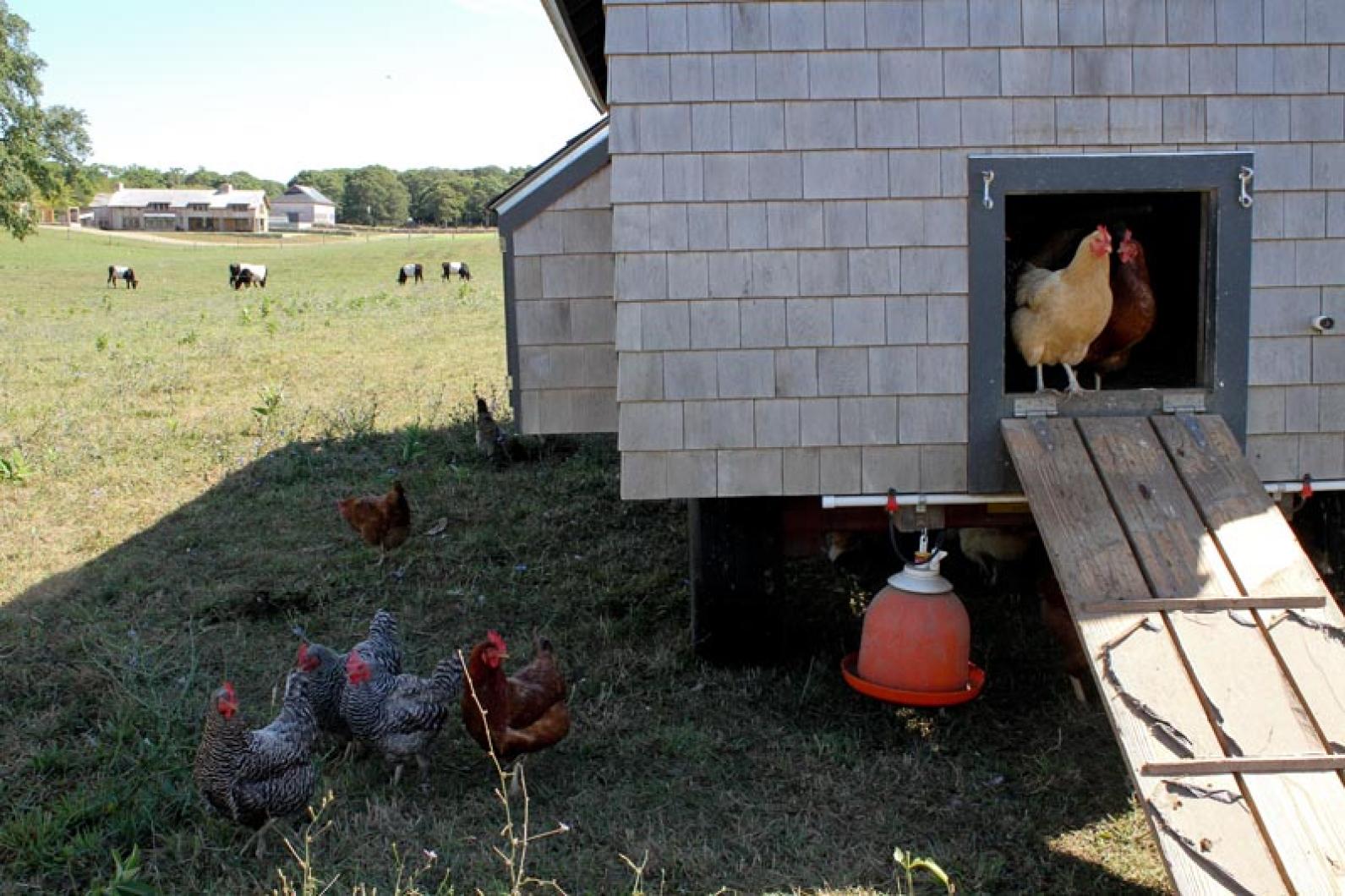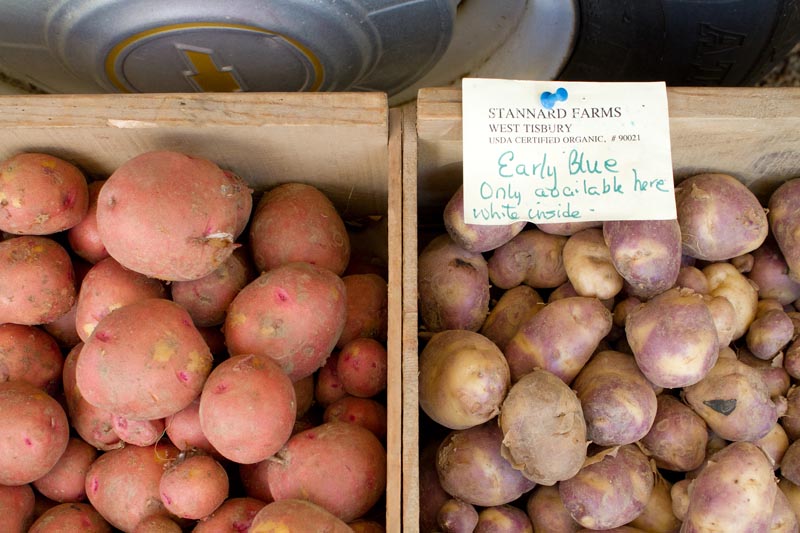When state Agriculture Commissioner Greg Watson made his swing through a series of Vineyard farms last week, there was detailed discussion about what constitutes organic farming.
Against that backdrop, two Vineyard farms are now federally certified as organic.
The Grey Barn and Farm in Chilmark received its certification last week, joining Stannard Farms of West Tisbury as the Island’s only certified organic farming operations. Stannard Farm, a vegetable growing operation, has been certified since 1990. The Grey Barn is a meat and dairy operation.
It has been a three-year process for the Grey Barn to earn organic certification for both its land and animals. Owners Eric and Molly Glasgow bought the former Rainbow Farm property in 2009.
Becoming a certified organic farm was part of the vision, Mrs. Glasgow said from the farm stand Sunday morning, where a large refrigerator holds glass bottles of organic milk, buttermilk and eggs next to a freezer filled with organically-raised beef, pork and veal.
“I feel its important on a larger scale, on a global scale as well as a local scale,” she said. “What you put into the earth here affects what you put into the earth anywhere. I feel pretty strongly about that.”
The Grey Barn uses some organic grain for the chickens; the cows and pigs are all grass-fed. Although the quantity of organic grain used on the farm is small, the impact from just a small amount of certified organic grain is large, Mrs. Glasgow said.
“Because that farmer had to meet the same standards we have to meet, that means that bit of land is that much better and that much more taken care of,” she said.
Organic certified farms must abide by a list of farming practices and methods called National Organic Standards, governed by the U.S. Department of Agriculture. Practices include the use of substances and materials that have no adverse effect on the environment and maintain the nutritional quality of the food. A National Organic Standards Board reviews all the materials. A third party certifier issues the certificate. For Grey Barn and Stannard Farms, the certifier was Bay State Organics. Both farms are inspected annually.
The Organic Materials Review Institute, a third-party nonprofit organization, also provides a list of certified organic products.
Mr. Glasgow described the detailed process.
“Over the last two and half years we’ve developed protocols,” he said. “We have products that if things come up we know what we’re using. We’re trying to keep the cows really healthy.”
An animal that has been treated with antibiotics must be taken out of the organic system.
As of 2011, a new rule for organic dairies requires farmers to record the grazing activities of cows. Cows must receive 30 per cent of dry matter intake from foraging directly, which means “you cannot run a confinement dairy where you grow grass and chop it up and feed it to the cows so they never go outside,” Mr. Glasgow said. “You have to keep the feed records that prove the cows ate grass.”
The rule is easy for the Glasgows to follow — their Dutch belted cows live on the pasture and rotate daily. Mrs. Glasgow said people are surprised to see the cows living outside and not in a barn.
Everything the farm uses must be certified organic.
Logistics are the costliest part of the process, Mr. Glasgow said.
“If we run out of [our own organic hay] we run out of hay,” Mr. Glasgow added. “You have to be on top of it and you can’t substitute for things.”
Farmers must request from their certifier if they plan to change a product, which can be tricky, he said.
“Oftentimes it can be frustrating because you have to figure it out on your own. Especially as a relatively new farmer, it can be hard,” he said.
Lisa Fisher, owner of Stannard Farms, has her own challenges, including finding the perfect certified organic seed for green beans. Ms. Fisher said she relies on some of the well-established organic seed companies like Johnny’s Seeds based in Maine.
“I figure they’re not messing up the world,” she said picking her organic green beans this weekend. “There are enough people messing up the world. I’d hope that I was making it better.”
He organic methods include cover crops and mulching with her own organic hay. She gives her chickens organic feed, although her chickens are not certified, only her land is. She sprays her sweet corn with oil and an organic insecticide called Bacillus thuringiensis.
For many farmers, paperwork can be the biggest deterrent to going organic, but Ms. Fisher prefers to see it as valuable record-keeping.
“So I can tell what I’m doing out here,” she said. “I don’t see organic standards records as being an excuse not to be certified. I’m tired of that la-la.”
She fiercely guards the term organic. “There are lot of people who believe they are organic and they don’t know how inorganic they are,” Ms. Fisher said. “Unless they go by the rules, how is anybody to know how they’re doing?”
At the Allen Farm in Chilmark, owners Mitch Posin and Clarissa Allen use organic farming practices, but are less concerned about becoming certified. “We don’t feel the need to be certified because we’re selling everything on the farm,” Mr. Posin said.
The Allen farm sheep graze on grass supplemented with hay.
“That’s as about as basic and easy as you can get,” Mr. Posin said. “We use [our own] compost tea and if we do fertilize it’s with organic fertilizer.”
Organic products have a richer nutrient density, he said, which is good for the soil, and healthy soil has more natural defense mechanisms against pests.
Soil that is rich in organic matter has more complex sugars that are “indigestible to critters,” Mr. Posin said. “They were put here for a reason, for natural selection and to get rid of the inferior stuff . . . that’s the beauty of the organic world, making it unattractive to bugs.”
The Farm Institute in Katama also uses organic farming practices but is not certified. Feed for chickens and pigs is not organic, but cows and sheep graze in fields and are fed organic hay. Organic practices are used in their vegetable garden. Executive director Jon Previant said this fall the farm will discuss the issue of becoming certified organic.
“We’re more concerned at this point in making sure that we accomplish goals that involve no [preventative] antibiotics or hormone use for all of our animals and humane handling,” he said. “As we build an alternative food production system to the industrial system we have to make sure we have to do it with integrity and not cut any corners. We’re not going to move forward into organics until I know as a farm unit we’re ready to do it properly.”
This column is meant to reflect all aspects of agriculture and farm life on the Vineyard. Remy Tumin may be contacted at 508-627-4311, extension 120, or e-mail her at rtumin@mvgazette.com.








Comments
Comment policy »